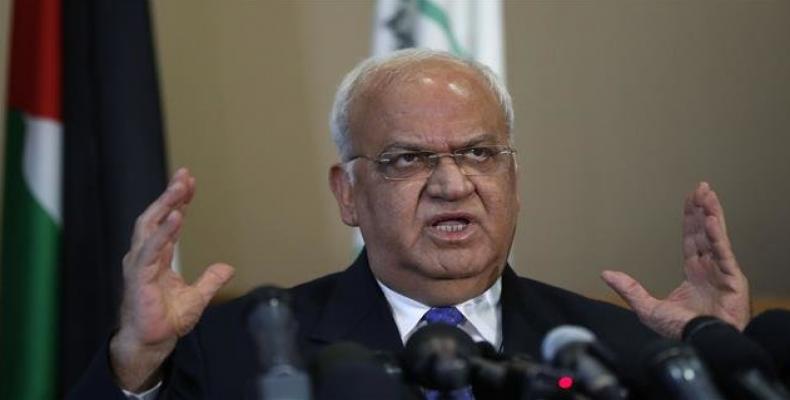Ramallah, October 19 (RHC)-- Palestine Liberation Organization Secretary General Saeb Erekat has strongly condemned a recent decision by the U.S. administration to downgrade its consulate for Palestinians by merging it into its controversial embassy in the Israeli-occupied Jerusalem.
“The (US President Donald) Trump administration is making clear that it is working together with the Israeli regime to impose Greater Israel rather than the two-state solution. The U.S. administration has fully endorsed Israeli narratives on Jerusalem, Palestinian refugees and settlements.”
“Palestine will not remain silent and will take all necessary steps in response. The move underscores the fact that U.S. cannot play a peacemaking role. The Trump administration is part of the problem, not part of the solution,” the high-ranking Palestinian official said.
Earlier in the day, U.S. Secretary of State Mike Pompeo announced that the US diplomatic mission in occupied territories, which deals with Palestinians, is being merged into the controversial new embassy in Jerusalem.
Israel occupied Jerusalem in 1967 in a move never recognized by the international community. The Palestinians want the city as the capital of their future state.
“This decision is driven by our global efforts to improve the efficiency and effectiveness of our operations. It does not signal a change of US policy on Jerusalem (al-Quds), the West Bank, or the Gaza Strip,” Pompeo claimed in a statement.
Erekat, however, rejected the claim and said the move “has nothing to do with ‘efficiency’ and a lot to do with pleasing an ideological U.S. team that is willing to disband the foundations of American foreign policy, and of the international system, in order to reward Israeli violations and crimes.”
Tensions have been running high in the occupied Palestinian territories and the Gaza Strip since last December, when Trump decided to recognize Jerusalem as Israel’s “capital” and relocate Washington’s embassy from Tel Aviv to the Palestinian city.
On December 21st last year, the United Nations General Assembly overwhelmingly voted in favor of a resolution that calls on the U.S. to withdraw its controversial policy shift. Despite the vote, the US went ahead with the embassy transfer on May 14, triggering angry protests in Gaza, the West Bank and elsewhere in the world. Israel’s crackdown in Gaza left over 60 protesters dead in Gaza on that day alone.
Angered by Trump’s move, Palestinian President Mahmud Abbas boycotted his administration, saying Washington is no longer qualified to serve as the sole mediator in the decades-long conflict with Israel, and that an international mechanism should be devised to replace the U.S. in the so-called peace process.
Pompeo’s announcement came weeks after the U.S. shut down the Palestinian mission in Washington amid sour relations between the two sides. The US has also slashed funding for the Palestinians by hundreds of millions of dollars.
The U.S. consulate for Palestinians reports directly to the Department of State in Washington, and its merger into the embassy for Israel in Jerusalem al-Quds could be seen as American recognition of Israeli control over the occupied West Bank and East Jerusalem, according to analysts.
In remarks to The New York Times, Daniel C. Kurtzer, an ex-envoy to Israel under Republican and Democratic administrations, said the Trump administration’s decision regarding its mission for Palestinians in the occupied territories would certainly be counterproductive.
“It’s another nail in the coffin that they’re constructing themselves with regard to their desire to advance the peace process,” Mr. Kurtzer said.
“Now, the message is, we’re not going to even give you the respect and dignity of having a representative designated to deal with you. They’ll have to deal with [Ambassador to Israel] David Friedman, if he deals with them at all.”
Palestinians rap U.S. decision to merge Jerusalem consulate into Israeli embassy

Related Articles
Commentaries
MAKE A COMMENT
All fields requiredMore Views
- Nicaragua celebrates the 46th anniversary of the Popular Sandinista Revolution
- Cuba's Dream in the Volleyball Nations League Becomes More Challenging
- Cuba commemorates another anniversary of the Popular Sandinista Revolution of Nicaragua
- Trump frees U.S. Marine who murdered three in Venezuela prison swap
- Nicolás Maduro praises Venezuela-Cuba brotherhood on Moncada anniversary

